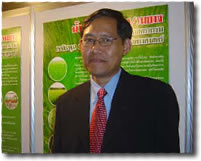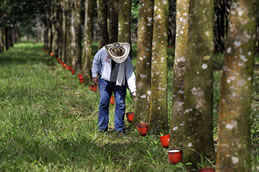 Assoc. Prof. Dr. Sayan Sdoodee from the Department of Plant Science, PSU Faculty of Natural Resources, revealed that the climate change in the past not only caused geographical catastrophic events, such as coastal erosion and landslides, but also affected the southern Thai crops, especially the rice, rubber, and fruits. The agricultural production of these crops is likely to decline because of the seasons’ change. A good example of this phenomenon is the heavy rainfall from two years ago that turned into prolonged droughts this year.
Assoc. Prof. Dr. Sayan Sdoodee from the Department of Plant Science, PSU Faculty of Natural Resources, revealed that the climate change in the past not only caused geographical catastrophic events, such as coastal erosion and landslides, but also affected the southern Thai crops, especially the rice, rubber, and fruits. The agricultural production of these crops is likely to decline because of the seasons’ change. A good example of this phenomenon is the heavy rainfall from two years ago that turned into prolonged droughts this year.
Widening tropical zone?
It is expected that El Nino and La Nina will occur more often, and summer and rainy season will turn into dry season and flood. Since these changes are occurring right now, predictions for the future are uncertain. However, it is observed that today’s climate in Songkhla province is similar to the climate in Kuala Lumpur, the capital of Malaysia. This could indicate a wider expansion of the tropical zone in the world. Another effect of this phenomenon is that fruit harvest seasons in Songkhla, Malaysia, and Indonesia began to overlap. Furthermore, the climate in Chanthaburi and Rayong is similar to that of southern Thailand; therefore, the fruit harvest seasons are starting to overlap in all affected regions.

Climate change causes many problems for the Thai agriculturists because long-living fruit trees, such as southern langsat, rambutan, and mangosteen, which produce fruits seasonally, changed their season from March-April—which has dry weather to help stimulate flowering—to July-August—which stimulates flowering in October and results in fruit production at the end of the year. Whether this change is permanent or temporary is currently unknown.
Rubber problems in the South
 In addition, climate change affects planting rubber trees. In the past, leaves fell in the dry season, and new leaves started to sprout in April, ready for the rainy season. However, the rain during the dry season makes the leaves damp and forms a disease that causes the leaves to fall prematurely. This causes changes in the rubber-tapping period. For example, last year, the start of tapping period was delayed from May to July, decreasing the time suitable for tapping from around 150 days to around 110 days. Now, Assoc. Prof. Dr. Sdoodee is researching the impact of the climate change on rubber production in southern Thailand, an effort supported by the Thailand Research Fund.
In addition, climate change affects planting rubber trees. In the past, leaves fell in the dry season, and new leaves started to sprout in April, ready for the rainy season. However, the rain during the dry season makes the leaves damp and forms a disease that causes the leaves to fall prematurely. This causes changes in the rubber-tapping period. For example, last year, the start of tapping period was delayed from May to July, decreasing the time suitable for tapping from around 150 days to around 110 days. Now, Assoc. Prof. Dr. Sdoodee is researching the impact of the climate change on rubber production in southern Thailand, an effort supported by the Thailand Research Fund.
Assoc. Prof. Dr. Sdoodee also suggested that, in order to deal with the climate change, rice farmers should switch to a fast-growing rice strain. Moreover, fruit tree growers should develop strategies to deal with the changing harvest period. Another thing to consider is the proliferation of various germs due to climate change, making rubber trees more prone to infection with powdery mildew that can cause all the rubber trees in the plantation to be parched and dried. This is the reason why Malaysian agriculturists started growing palm trees instead of rubber trees. Dr. Sdoodee thinks that growing palm trees might be a viable alternative in southern Thailand as well, because the increasing amount of rainfall does not have any impact on their growth.



